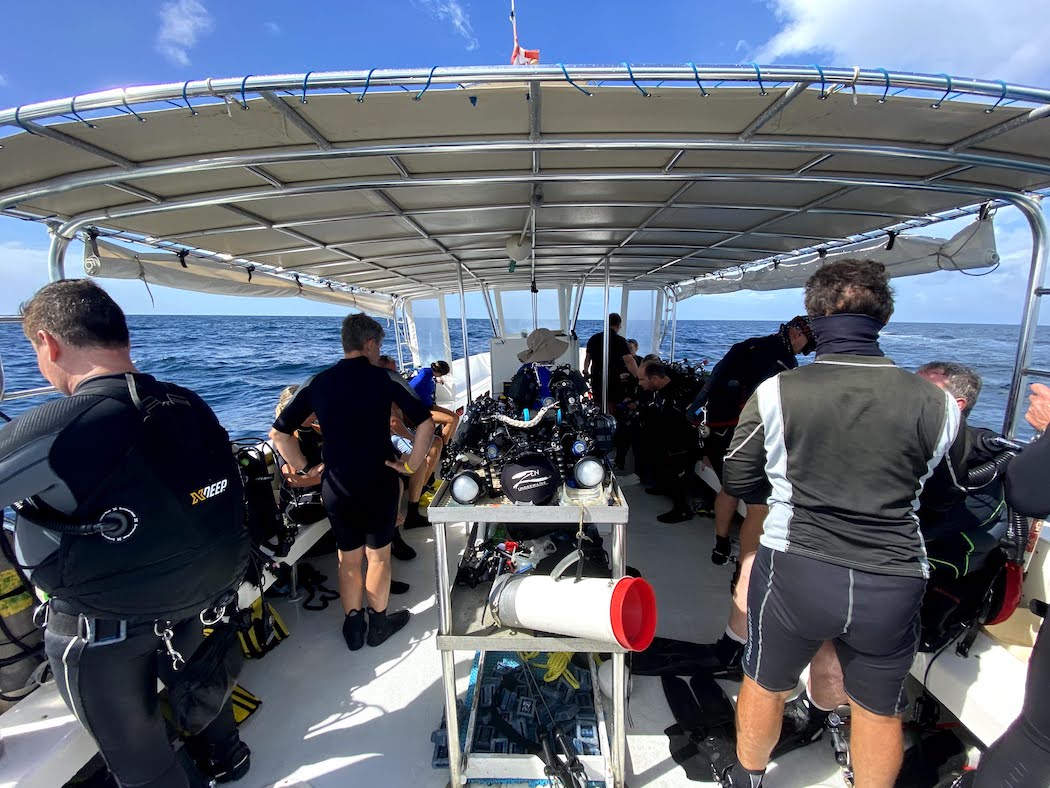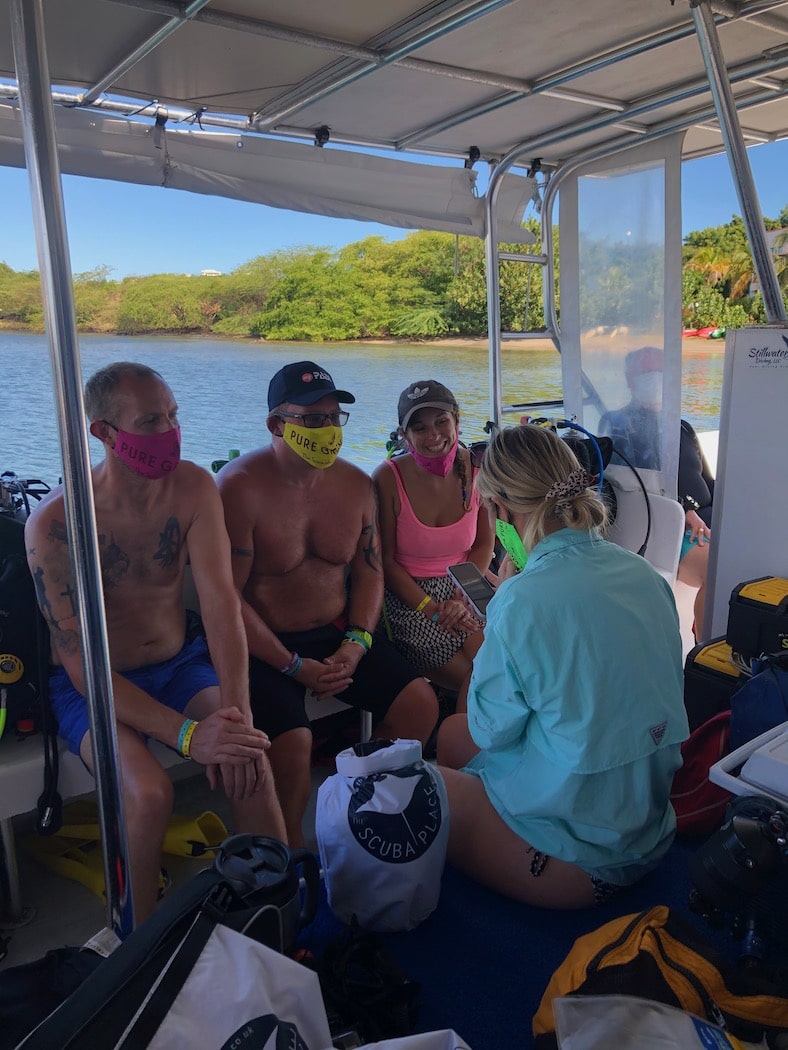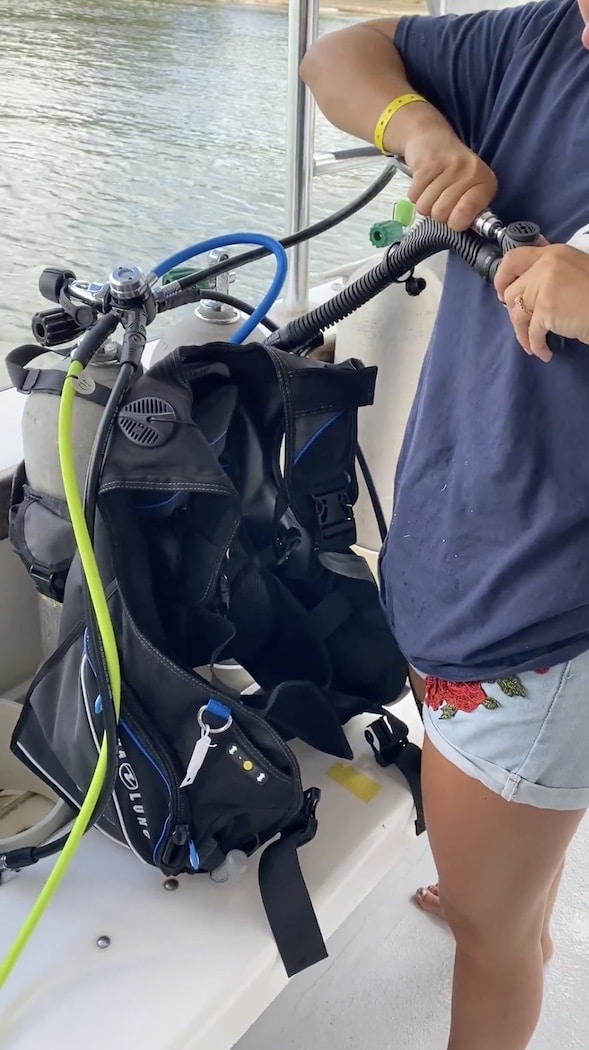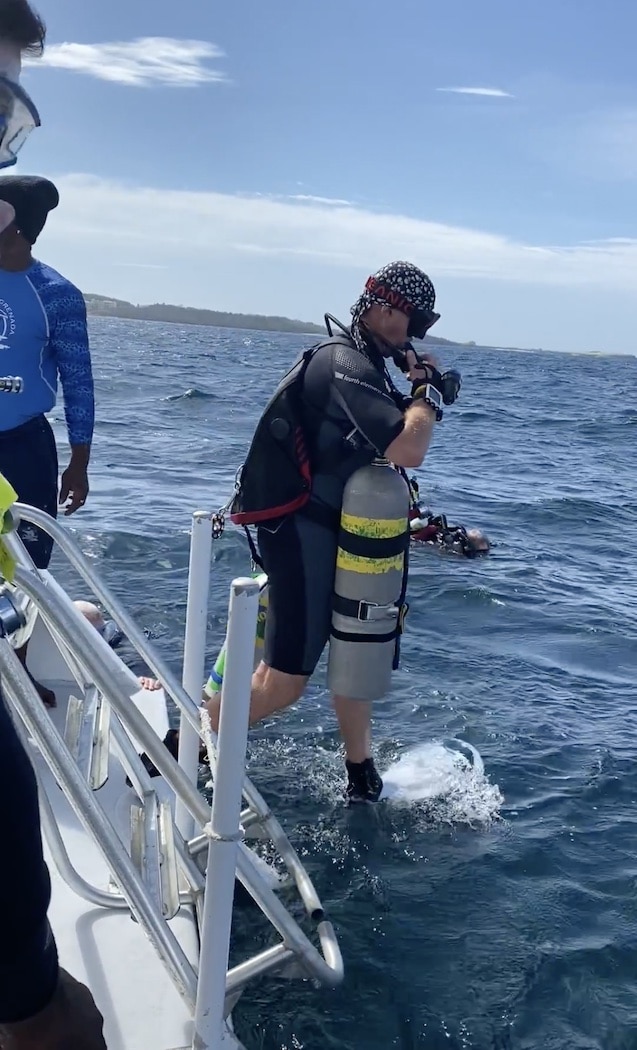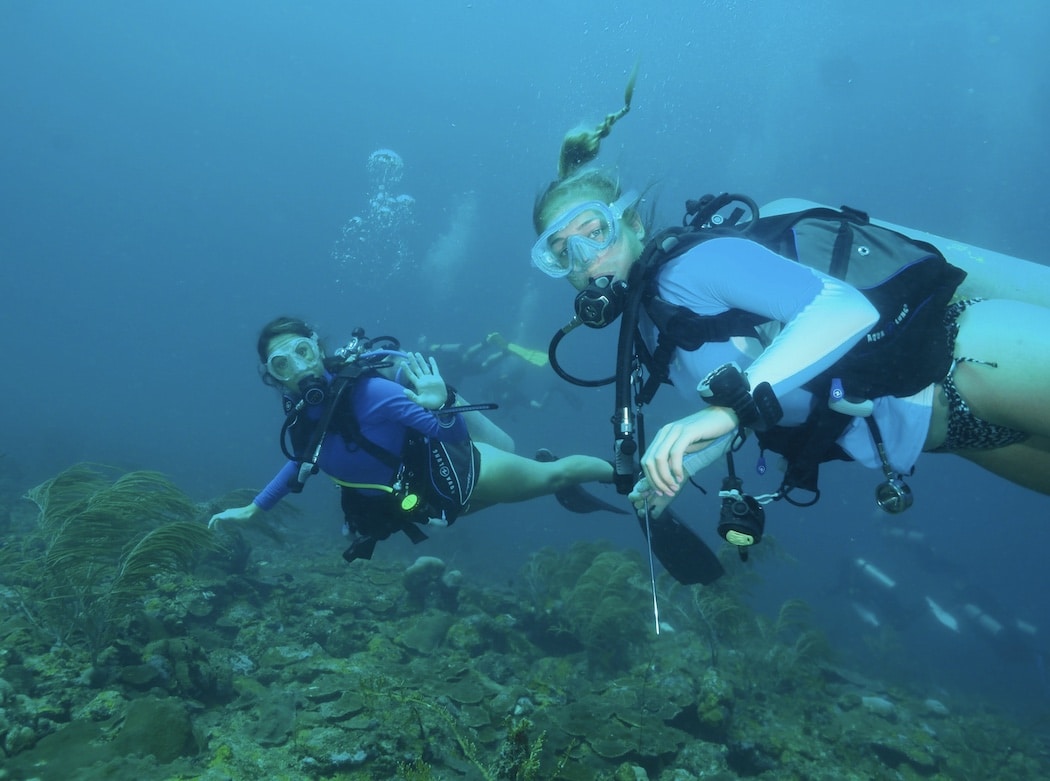Dive Training Blogs
Anxiety and Diving – My Story
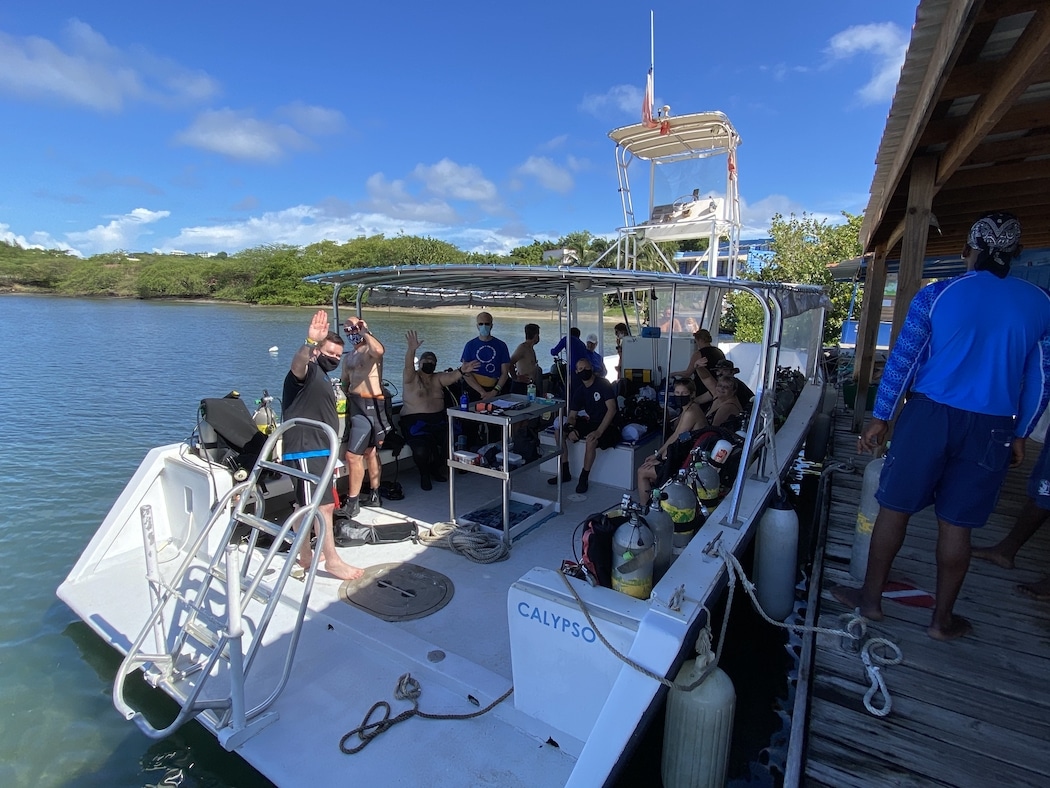
What can you do to help a friend or a dive buddy who experiences anxiety? Chloe from The Scuba Place shares her personal experience dealing with anxiety in and out of the water.
Lockdown is nearly over! None of us knew how long it would last, what to expect or what to do. Throughout lockdown, we’ve been restricted from working, socialising, doing what we love, seeing who we love and so much more. The long-term restriction has affected some more than others and has taken a toll on the mental health of many. I feel it’s important to discuss this so we can better understand how lockdown has affected people not just physically and socially, but mentally, so that when the time comes, we’ll be ready to get back into diving safely. To that point, I would like to share my struggles and experiences with my mental health in and out of the water, so others can learn and become more aware.
One aspect of mental health I want to address in particular is anxiety. Anxiety affects everyone, even though you may not realise it! Anxiety can include feelings of nausea, lack of motivation, becoming lazy or over-active, shutting down, or acting fidgety, over thinking situations or feelings of underachievement, and many many more symptoms. I personally don’t like to define the term anxiety, because I don’t believe there is one specific definition. What we need to take notice of, is that if any of these thoughts start to feel like they can’t be controlled, it can lead to a panic attack. Panic attacks can be life threatening, especially under water, so it’s important we learn more about what to do if it happens. I personally struggle with anxiety and panic attacks, which can be quite difficult, especially when you’re a diver. I thought I would share some mishaps I’ve had in the past, how I overcame them, and how having a buddy who’s aware can reduce stress and danger.
For me, I couldn’t tell you why I am anxious 70% of the time, and that is extremely frustrating. Not knowing where these emotions are coming from is particularly overwhelming for me, and I often work myself up into a panic attack. Over time, I have learnt to accept my anxiety, acknowledge it’s there, and use some coping mechanisms to help although, I haven’t perfected this yet! There are certainly times where I can’t tell myself I’ll be ok in ten minutes, an hour or tomorrow. The feelings can be constant and intense, but I’m learning that it’s ok. Everyone can experience some form of anxiety, and it is normal. For the other 30% of the time, not knowing an outcome can get my anxiety rocketing! So, for someone who isn’t the most experienced diver, I tend to feel sick to my stomach before and during a dive trip – and I promise it’s not the sea sickness, not all of it anyway!
As I mentioned previously, anxiety can be different for everyone, but by sharing how it manifests for me, I hope others can learn more about it, and others who experience anxiety can feel comfortable talking about it. As I’ve not known what causes most of my anxiety, it’s been difficult to pinpoint triggers, but after some time I’ve established that anticipation can be really hard for me. All the build-up to a dive; waking up in the morning, making sure I’m eating enough for breakfast, getting dive kit on the boat, the dive briefing, travelling to the dive site, kitting up and pre-dive safety checks. It can be a lot of waiting and anticipating. Anticipation kills me and I have no idea why.
Let me share an experience from my last diving trip. We were lucky enough to go to Grenada in October 2020. I hadn’t been diving for three years, and in all honesty, I was incredibly nervous. I knew I would be anxious to go diving again because I wanted to make sure I could remember how to dive well, and safely. My biggest fear was putting anyone else at risk, and I think this made me overthink so much. My anxiety was already on board the plane to Grenada before I was!
Luckily, my dad had a conversation with my instructor the day before our first dive to let him know about my anxious tendencies and my panic attacks. I didn’t feel as though I could say anything myself, and I felt a bit embarrassed to talk about it. Looking back on it now, that seems silly. Nonetheless, if you feel as though you can’t speak to your buddy or instructor yourself, it’s perfectly ok for someone who knows to talk to them for you. I know for a fact it made me feel a lot more comfortable straight away. When the morning came for our first day of diving, I was agitated, fidgety, very quiet and I felt sick. However, I did want to go diving. I have such amazing memories from my previous experiences, I knew it was just my brain telling me nonsense through anxiety. But with that first giant stride, my anxiety was literally washed away! I felt all the wonderful emotions that I had on my first ever dive, and every dive since!
It’s certainly important to take the small wins with anxiety to help you when you can’t seem to shake it. For example, the first day of diving in Grenada was a good day for me. Granted, I felt dreadful all morning, but as soon as I hit the water, I was fine. So, how do I deal with my anxiety when it doesn’t disappear, or panic creeps up on me in the water? If you’re a Rescue Diver, you’ll remember that PADI advise an anxious diver to Stop, Think and then Act. This is done through communicating with your buddy, signalling, and then slowing down or stopping until the feeling subsides. This is great advice! Great communication with a buddy massively helps an anxious diver and is another reason why your buddy should be informed if you tend to get anxious during diving. I want to take PADI’s advice a bit further and share what helps for me.
Unfortunately, I have had anxious moments underwater that have led to panic attacks, but how my buddy(s) dealt with it saved us from being in any serious danger. When I feel a panic attack coming on, its sudden and immediate, and the massive wave of anxiety scares me so much I go into a panic. When underwater, I tap my buddy, if they haven’t noticed first, and tell them there’s a problem, and signal it’s my anxiety and I can’t control it. What has helped me best is when my buddy signals if it’s ok to put their hand on my arm – sometimes I welcome a physical touch, other times I feel claustrophobic and want as much space as possible – and look into my eyes. Then with a signal to take slow, deep breaths, we do this together. After a minute, I decide if I feel well enough to continue the dive. Most of the time this is the case, and we continue the dive but if I can’t control my breathing, we end the dive. It’s as simple as that. We get to the surface as quickly and safely as we can (including the safety stop, I must force myself through this) and I have help removing all my kit on the surface.
I can feel trapped when I have a panic attack, so I’ve learned that removing my kit helps a lot. If I still can’t control my breathing, I have been lifted onto the boat and I lie down until I can calm down. Having my buddy next to me and reassuring me it’s ok really helps! The one thing I appreciate most when I’m anxious is acceptance. Having someone next to me telling me what’s happening is ok can be so helpful. So much more helpful than someone who is freaking out about what they need to do to help. For me, I typically need space, reassurance, and water when I’ve calmed down.
I hope sharing my experiences, and how I deal with my anxiety, helps you or someone you know feel more comfortable when dealing with anxiety. If you get feelings like me, I hope you’ll now feel more comfortable talking about it. If you have a dive buddy who gets anxious, I hope this gives you a little insight on what you could do to help. Make sure you ask them about their anxiety, what triggers them and what helps them. Everyone is different! As we build up to a dive, many people have feelings of nervousness, fear, or apprehension. Is this what we call anxiety? However you take it, these feelings are completely normal and I’ll say this over and over again! It’s become my mantra because as an anxious person, I worry so much about affecting other people with my anxiety. I hate slowing down a dive because I feel wobbly, I hate having to end a dive because I’m panicking for an unknown reason. These thoughts will stay with me for the rest of the day and into the night because I feel so guilty. Yet, it happens! It happens to a lot of people and the more we say it is ok, the less people will feel isolated, guilty for having normal emotions, or that they can’t talk about their feelings.
When we scuba dive, we are literally jumping into a new world, an alien environment. It is so important to remember that we aren’t built to breathe underwater, so the concept of doing so may throw our brains sideways a bit! Anxiety can be different for every person and that’s why it’s so important to share your feelings with your buddy, instructor, and others. Anxiety is normal, and it’s perfectly OK! Everyone experiences it and the best thing we can do is talk about it and educate people. We can then be more aware so we can help those who need it. But remember, even if your buddy isn’t an anxious diver, always check up on them, because a great buddy relationship makes for even better divers.
Find out more about the worldwide dive itineraries that The Scuba Place offers at  www.thescubaplace.co.uk.
www.thescubaplace.co.uk.
Blogs
PADI Recognises EMEA Members with New Professional Development Excellence Award

PADI® (Professional Association of Diving Instructors®) has recently launched their new Professional Development Excellence Award in EMEA (Europe, Middle East and Africa), celebrating PADI Five Star Instructor Development Centers (IDC) that are championing creating more PADI Professionals, at all levels, during the previous calendar year.
“While becoming a PADI Five Star IDC Center is a prized accreditation amongst members, this exclusive rating comes with the responsibility of training the next generation of divers to become PADI Instructors,” explains Dave Murray, Managing Director for PADI EMEA.
“PADI’s commitment to a continuing education philosophy encourages divers to realise their dreams of a career as a PADI Pro, teaching others to do what they love – to scuba dive. This new recognition award distinguishes productive PADI Five Star IDC stores for the time and effort they dedicate to marketing and conducting the professional training needed to grow the scuba diving industry.”
PADI’s EMEA Professional Development Excellence Award recognises members for reaching specific milestones based on the number of PADI Pro certifications they issue annually. It also provides an extra layer of credentials in their “Pro Development Status” to potential Divemaster and IDC candidates, along with any other prospective Pro-level customers and prospective employees.
The first awards were distributed earlier this year, with 12 PADI Five Star IDC Centers receiving the Platinum Award. This means that they have issued a minimum of 100 PADI Professional certifications from Divemaster to IDC Staff Instructor, which include 30 Core Professional certifications and 70 Continuing Education Instructor level certifications.

The 2025 PADI EMEA Professional Development Excellence Award is already underway and renewed PADI EMEA Five Star IDC Dive Centers and Resorts are automatically eligible. Stores that reach the recognition levels during 2024 will receive their award in the first quarter of 2025.
For more information about the award and to see the full list of award recipients visit here.
About PADI
PADI® (Professional Association of Diving Instructors®) is the largest purpose-driven diving organization with a global network of 6,600 dive centers and resorts, 128,000 professional members, and more than 30 million certified divers to date. Committed to our blue planet, PADI makes the wonder of the underwater world accessible to all, empowering people around the world to experience, explore and take meaningful action, as Ocean TorchbearersTM, to protect the world beneath the surface. For over 50 years, PADI is undeniably The Way the World Learns to Dive®, setting the standard for the highest quality dive training, underwater safety and conservation initiatives while evolving the sport of diving into a passionate lifestyle. For divers by divers, PADI is obsessed with transforming lives and, with its global foundation, PADI AWARETM, creating positive ocean change. Seek Adventure. Save the Ocean.SM www.padi.com
Blogs
Two great programs to thrill and excite from RAID

RAID’s Performance Diver program is part of the training agency’s unique ‘tune-up’ options for divers at all levels, from basic to technical. Its appeal to newer divers who did not get all they wanted from their open water course (perhaps with a non-RAID dive centre) has always been strong. But it’s a winning option for someone who has been inactive for a while as well.
The skills taught in this course have been designed by some of the most respected dive professionals in the industry. They have condensed years of in-water experience into a great program that’s fuelled by great ideas and solid knowledge. Something useful in all sorts of conditions and all sorts of gear configurations. In short, a range of skills you will use on every dive: buoyancy, trim, situational awareness, gear selection and management, contingency planning… having fun and staying safe.
You can find out more about RAID’s Performance Diver program here.
And with the agency’s renewed focus in 2024 on breath-hold programs, July is a good time to read about the benefits of RAID’s range of Freediving courses.
Freediving is such an exhilarating and beautiful sport that allows you to connect with the underwater world in a unique way.
The thrill of diving deep down, holding your breath, and exploring the depths with just a single breath is truly an unforgettable experience.
It requires focus, control, and a deep respect for the ocean. The sense of freedom and tranquility you can find while freediving is unlike any other.
Have you ever tried freediving or are you interested in learning more about it? You do not have to be a scuba diver to start… not at all!
And if you are already a diver, RAID can help you discover a whole new way to look at a familiar world.
You can find out more about RAID’s Freediving courses here.
To find out more about RAID and the agency’s diver training programs, visit diveraid.com.
-

 Blogs2 months ago
Blogs2 months agoDiving With… Nico, Ocean Earth Travels, Indonesia
-

 News1 month ago
News1 month agoMurex Bangka Announce New Oceanfront Cottages & Beachfront Dining
-

 Blogs2 months ago
Blogs2 months agoA new idea in freediving from RAID
-

 Marine Life & Conservation1 month ago
Marine Life & Conservation1 month agoIceland issue millionaire whale hunter a licence to murder 128 vulnerable fin whales
-

 Marine Life & Conservation2 months ago
Marine Life & Conservation2 months agoThe Shark Trust Great Shark Snapshot is back
-

 News3 months ago
News3 months agoCharting New Waters; NovoScuba Goes Global with the Launch of their Revolutionary Dive Training Agency!
-

 Gear News1 month ago
Gear News1 month agoNew Suunto Ocean – a dive computer and GPS sports watch in one for adventures below and above the surface
-

 Marine Life & Conservation Blogs2 months ago
Marine Life & Conservation Blogs2 months agoBook Review: Plankton


